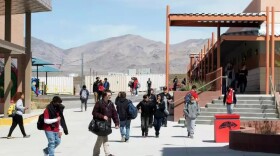The debate over the fairness of the criminal justice system has become a red-hot election year topic from the presidential campaigns on down.
Here in Nevada, two lawmakers want to educate the public on the issue and spark a discussion that will carry to the Legislature when it convenes next year in Carson City.
Assemblywomen Olivia Diaz and Dina Neal, of the Nevada Hispanic and Black legislative caucuses respectively, are seeking community input on the issue at a town hall set for Wednesday evening at Nevada State College.
Assemblywoman Olivia Diaz said the state needs to look at whether it is being smart on crime.
"We know that as a state we have inadequately funded our education system for many, many years and I think that if we were smarter with how we deal with crime I think that would free up some of our revenue to then give it to education," Diaz said.
Diaz said it costs the state on average $24,000 a year to house an inmate versus the state per-pupil education funding of about $9,000.
She believes better policy decisions and money spent wisely before someone gets into trouble with the law will pay off.
Diaz also said laws and sentencing don't take into account the lifelong consequences for young people.
"I think that sometimes our laws are very heavy handed and we throw the book at people, but I think we're not reasoning through what does that mean," she said.
Assemblywoman Dina Neal agreed that the current justice system doesn't take into account the long term impact a conviction, especially a felony conviction can have.
"We have seen the after effects of how a crime 10 years later limits the ability for that person to function with the community and live some what of a whole life," Neal said.
Neal explained that once someone has been convicted of a felony they often can't get a job or housing or education. Employers don't trust convicted felons, housing subsidies aren't available to people convicted of certain felons and they can't get student loans for college. And someone who is a convicted felon in the state of Nevada cannot vote.
Diaz believes the state needs to start looking at being "felony smart" not "felony stupid."
“I just don’t think by attaching a category A, B, C, D, E felony to it is going to discourage people from committing a crime," she said.
Assemblywoman Neal pointed to a bill in the last legislative session that would have made graffiti, regardless of the damage, a category D felony. Neal said that under that bill a 16 year old could have spent two years in prison and possibly missed out on college because certain felonies prevent people from getting financial aid.
"So there are these collateral consequences that we're always trying to ask ourselves about, which is 'is this fair?' 'is this just?' What are the long term effects of what this D felony means for a teenager," she said.
Neal also has concerns about racial bias in the justice system. She said according to statistics from the Nevada Department of Public Safety, a full third of all adults arrested in Clark County were African American, but African Americans are not a full third of the population.
"I know that law enforcement is taking aggressive efforts to change their policy," she said, "But is [bias] still prevalent? These were 2014 numbers. There must be some level of bias going on."
Both assemblywomen agree that policymakers need to be looking at the state's laws and the impact their having on people's lives.
"There is very much a difference between revenge and justice," Neal said, "And you have to draw the fine line between what that is."
Olivia Diaz, Assemblywoman; Dina Neal, Assemblywoman








